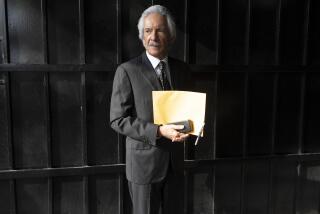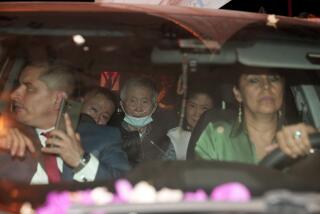JOURNALISM : Ruling Against Editor in Peru Shows Obstacles to Free Press
- Share via
LIMA, Peru — The editor of Caretas, Peru’s leading newsmagazine, is making a last-ditch legal appeal to reverse a criminal judgment against him for defaming a close adviser to President Alberto Fujimori.
Editor Enrique Zileri says the defamation case was aimed at discouraging critical press coverage of the government but has not changed Caretas’ independent editorial policy. Fujimori has denied any government role in the case and has repeatedly voiced guarantees of full press freedom.
But the Caretas case is one of several signs that freedom of information in Peru, if not now openly suppressed, is subject to a gantlet of potential obstacles in a country where the constitution is not always respected and where a bloody guerrilla war is being fought.
“In recent months, Peruvian journalists have suffered a continuous pattern of harassment and legal persecution which gravely imperils press freedom there,” said a March report by Americas Watch, a Washington-based human rights group.
After Fujimori took office in 1990, Caretas published an article depicting presidential adviser Vladimiro Montesinos as a “Rasputin” who exercised sinister power behind the scenes in the presidential palace. In 1991, Montesinos filed a defamation complaint based on the article. A criminal court judge ordered Zileri to pay reparations.
In a recent interview, Zileri said the criminal complaint was aimed at convincing the magazine not to publish a second article reporting that Montesinos, a lawyer, had once signed papers guaranteeing rental payments for a house leased by a cocaine trafficker who was his client. “I think the main idea was to keep us quiet,” Zileri said.
But Francisco Chirinos, Montesinos’ attorney, said the complaint against Zileri was filed in compliance with Peruvian law, which permits anyone to seek redress for defamation or libel.
“Zileri and certain press organs have wanted to present this to the world as an offense against press freedom, and it isn’t,” he said, adding that it is not an attempt to pressure Caretas either. “If it were, it would be the most failed attempt in history, because the magazine has continued to attack Mr. Montesinos every week.”
The judgment against Zileri gave him a one-year suspended jail sentence and ordered him to pay the equivalent of about $40,000 in reparations to Montesinos. It also prohibits the editor from leaving the country without court permission.
Zileri appealed to the Superior Court, which maintained the suspended sentence and reduced the reparations to $2,000.
On April 5, 1992, Fujimori closed the Peruvian Congress and courts in a military-backed “self-coup.” Charging that the courts were corrupt and politicized, he replaced judges at all levels, including the Supreme Court.
In August, the reshuffled Supreme Court ruled against a second Zileri appeal, raising the amount of reparations to $10,000. The suspended jail sentence was later increased to 18 months.
Zileri has filed a final appeal for judicial protection on the grounds, he said, that the Supreme Court ruling contained no legal justification and was not impartial. “I think this is a totally arbitrary sentence,” he said, adding that he questions the court’s impartiality because Montesinos has influence in judicial matters. “He is very intimately connected to the judiciary, choosing judges, kicking people out,” Zileri said.
At the time of the April coup, security forces temporarily occupied some news media offices in Lima, including Caretas’, and detained several journalists. One of those detained was Gustavo Gorriti, a columnist with Caretas who continues to write critically about Montesinos and the Fujimori government.
“Up to a certain point, there is freedom of expression, no doubt,” Zileri said. But he said he thinks the government applies “subtle, indirect” pressure on the news media.
More to Read
Sign up for Essential California
The most important California stories and recommendations in your inbox every morning.
You may occasionally receive promotional content from the Los Angeles Times.













